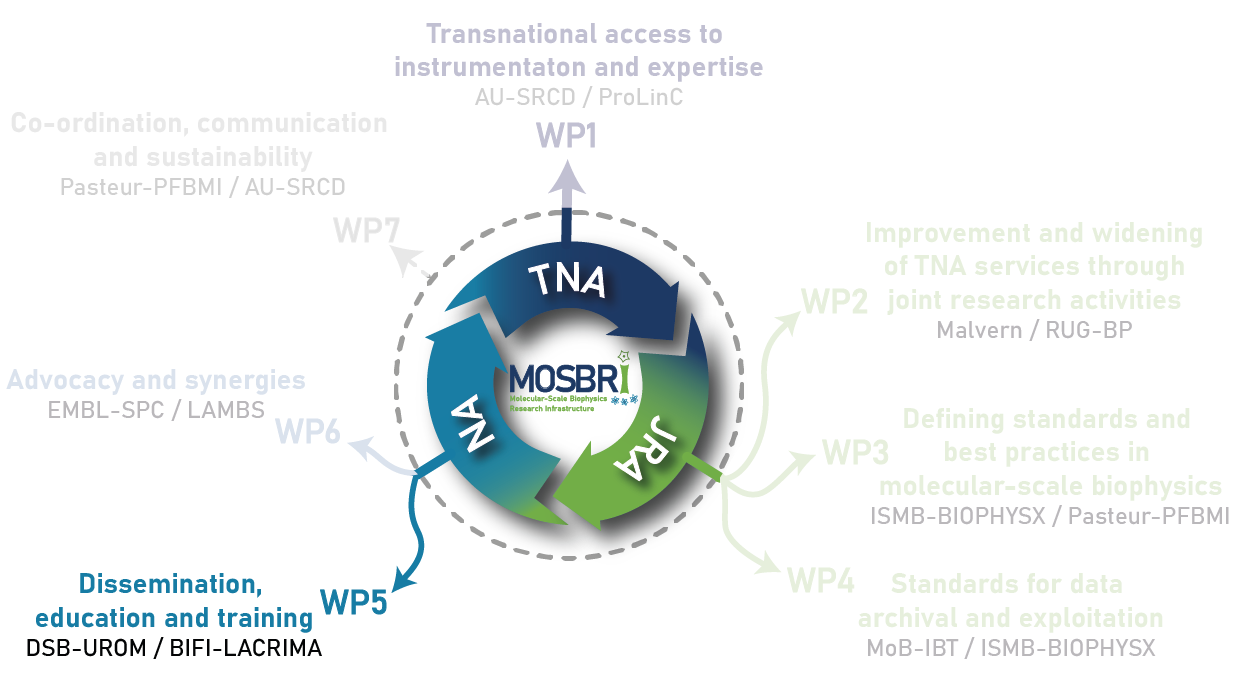WP5: NA – Dissemination, education & training
- Leader: Francesca Cutruzzola (DSB-UROM, Rome, IT)
- Co-leader: Javier Sancho (BIFI-LACRIMA, Zaragoza, ES)
WP5 serves as a connection between the MOSBRI infrastructure, the TNA users, and other stakeholders in the molecular biophysics field and beyond, both in academia and in industry.
In this WP, we aim to:
- Disseminate outcomes and ensuring active visibility within the scientific community, by hosting and participating in international conferences and events, and by using media such as the project website and social networks.
MOSBRI will hold biennial conferences open to the biophysical community world-wide. These conferences with gather scientific talks from MOSBRI centre scientists as well as from users. External speakers will be invited to present significant technological developments. The first conference will be associated with the project’s kick-off, to be held at the Institut Pasteur, in Paris. The MOSBRI conferences will bring together leading researchers, young members of the MOSBRI network and external experts. The conferences are intended to foster the different activities planned and contribute to the global success of the network.
- End-users training schools and short courses
One of MOSBRI’s central aims is to contribute to the raising of a new generation of researchers and engineers, ready to optimally exploit and eventually further develop all the essential tools for their research, through high-quality training of students and scientists, both from academia and industry. Rapid dissemination of novel developments application fields of biophysical methods, will emphasize cross-fertilization and integration of techniques. These actions will foster optimal placement of post-docs in academia or in companies, thus providing added value to the job market.
We plan to organize in alternate years in different venues:
- 2 basic-level end-user schools (BLS) and 2 advanced-level end-user schools (ALS)
- 10 End-user short courses (ESC).
These training events are aimed at scientists from academia (graduate students, post-doctoral fellows) as well as from the industrial R&D sector. We envision a global coverage of all fields in which MOSBRI pipelines or instruments are involved. Course material will not only be provided to the participants, but also be openly shared through the project website to allow further dissemination of knowledge.
Read more about the training schools and short courses here.
- Stimulate the transfer of practical knowledge and skills through synergies within the consortium potentiated by staff exchange between partner sites
To promote and share specific skills and competences among the participant groups, and to enhance integration of different technologies and approaches within the MOSBRI network, we will contribute funds for two weeks of staff exchange per site over the 4 years of the project. The staff exchange will be as varied and widespread as possible and involve an evenly shared experience. This kind of opportunity should be especially valuable for the younger members of each team.
- Promoting high-quality education in the field of biophysics and attract young people to scientific careers in biophysics, through the participation of MOSBRI staff (in particular young PhD and post-doc scientists) in scientific educational events taking place in Universities and higher education centres.
The MOSBRI network aims at promoting awareness about the potential of biophysical techniques in higher education. It will contribute funds for one participation per partner to an event hosted in a University or other higher education institution. This opportunity to disseminate the importance of Molecular Biophysics should be especially valuable for the younger members of each team.
Several types of events will be targeted (conferences, teaching events in PhD courses/schools,…) in widespread geographical locations. MOSBRI will also advocate with university teachers its openness to be consulted and to provide advice. Training school teaching materials will be freely available to be used in university courses. Particular attention will be given to joint initiatives with existing Academic networks, such as the CIVIS network (European Civis University) recently launched by 8 academic sites over Europe.

